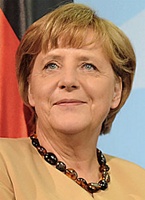European leaders for stronger supervision of financial systems
23 Feb 2009
European leaders agreed on the need to tighten global regulation to prevent any repeat of the crisis that has driven the world into recession, saying the financial system needs a wholesale overhaul.
 German Chancellor Angela Merkel hosted heads of state and finance ministers from Europe's largest economies to try to establish a common European position on economic reforms before a 2 April summit of the Group of 20 nations. The meeting was also attended by European Central Bank President Jean-Claude Trichet and Bank of England governor Mervyn King.
German Chancellor Angela Merkel hosted heads of state and finance ministers from Europe's largest economies to try to establish a common European position on economic reforms before a 2 April summit of the Group of 20 nations. The meeting was also attended by European Central Bank President Jean-Claude Trichet and Bank of England governor Mervyn King.
"All financial markets, products and participants including hedge funds and other private pools of capital which may pose a systematic risk must be subjected to appropriate oversight or regulation," Merkel said in a statement released on behalf of the summit members, following the talks.
Top officials from Britain, France, Germany, Italy, Luxembourg, Spain, the Netherlands and Czech Republic agreed on seven key points during their one-day meeting in Berlin, the statement said.
''We all agree now that in London, Europe wants to see an overhaul of the system,'' French president Nicolas Sarkozy told reporters after the talks. ''We're not talking about superficial measures. We're not talking about transitional measures. We're talking about structural measures that need to be taken.''
"A clear message and concrete action are necessary to engender new confidence in the markets and to put the world back on a path toward more growth and employment," Merkel said.
But the call for blanket global regulation was sure to be resisted by the financial industry and may not be entirely welcomed by other members of the G-20, which in addition to European nations includes the US, China, Japan and developing nations like India and Brazil.
Merkel urged stricter market regulation two years ago but met with strong resistance from the US and Britain. European leaders this time backed Merkel's call for a "charter of sustainable economic activity" to reduce economic imbalances and stabilise financial markets.
The charter would subject all financial market activities around the globe to regulation, including credit rating agencies. Merkel said the charter would be "based on market forces but prevent excess and ultimately lead to the establishment of a global governance structure."
Leaders also reportedly proposed increasing to $500 billion the International Monetary Fund's financial resources for crisis management, in light of problems recapitalising banks in Central and Eastern Europe. The IMF now has $250 billion in resources and already used $50 billion.
''These are testing times,'' British Prime Minister Gordon Brown said. ''We've seen the biggest global fiscal stimulus that has ever been done. We've seen the biggest interest rate cut the world has ever had. Today we decided that we need to do even more than that by working together.'' He said there was a need for ''a global system'' of financial supervision.
"The IMF's resources must be doubled to enable it to help its members swiftly and flexibly when they experience difficulties with respect to their balance of payments," Merkel said.
Other key points included adopting a "sanctions mechanism" to safeguard against tax havens and urging banks to keep larger reserves of capital.
"A new system of regulation without sanctions would not have any meaning," said Sarkozy. He said European countries were jointly drawing up a list of tax havens and the sanctions they might face for continuing what he called reckless financial activity.
Merkel also warned the US to avoid protectionism in its automobile market. "When I look at the restructuring plans of some American companies, there are a lot of state funds flowing into them," she said, swiftly adding that "this is not an accusation."
She said the European Commission would be asked to examine whether the US was violating global trade laws. The US government has extended multibillion-dollar bailout packages to General Motors and Chrysler, and the two companies asked for an additional $21.6 billion last week.
Sarkozy said that European leaders will ''do everything we can to convince the maximum'' number of G-20 members of the measures.
''We have no choice,'' Sarkozy told reporters. ''By 2 April we have to succeed and we can't accept that anyone or anything will get in the way of this summit, which will be a historic summit. We will be successful - if we fail there will be no safety net.''



















